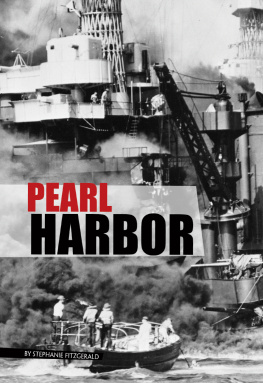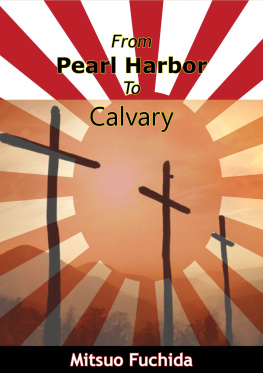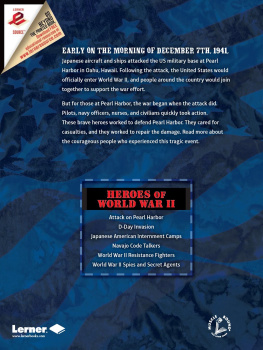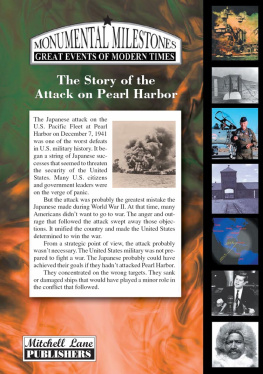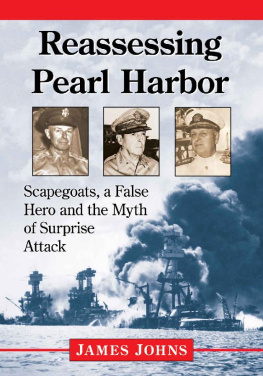GODS SAMURAI
Brasseys
THE WARRIORS
Series
Acclaimed books about combatants throughout history who rose to the challenges of war. Other titles in the series:
Jungle Ace: Col. Gerald R. Johnson, the USAAFs Top Fighter
Leader of the Pacific War
John R. Bruning
The Pattons: A Personal History of an American Family
Robert H. Patton
The Rogues March: John Riley and the St. Patricks Battalion, 1846-48
Peter F. Stevens
Victory at Any Cost: The Genius of Viet Nams Gen. Vo Nguyen Giap
Cecil B. Currey
Women Warriors: A History
David E. Jones
GODS SAMURAI
Lead Pilot at Pearl Harbor
GORDON W. PRANGE
with
Donald M. Goldstein
and
Katherine V. Dillon

First The Warriors edition published in 2004.
Copyright 1990 by Prange Enterprises, Inc.
All rights reserved. No part of this book may be reproduced, stored in a retrieval system, or transmitted in any form or by any meanselectronic, electrostatic, magnetic tape, mechanical, photocopying, recording, or otherwisewithout permission in writing from the copyright holder.
Library of Congress Cataloging-in-Publication Data
Prange, Gordon William, 1910
Gods samurai : lead pilot at Pearl Harbor / Gordon W. Prange with Donald M. Goldstein and Katherine V. Dillon. 1st The warriors ed.
p. cm. (The warriors)
Includes bibliographical references and index.
ISBN 1-57488-695-9 (alk. paper)
1. Fuchida, Mitsuo, 1902- 2. Pearl Harbor (Hawaii), Attack on, 1941. 3. World War, 1939-1945Aerial operations, Japanese. 4. World War, 1939-1945CampaignsPacific Ocean. 5. Fighter pilotsJapanBiography. 6. Japan Kaigun. KktaiBiography. 7. Fuchida, Mitsuo, 1902- I. Goldstein, Donald M. II. Dillon, Katherine V. III. Title. IV. Series.
D767.P69 2003
940.5426dc21
[B]
2003052227
Published in the United States of America
10 9 8 7 6 5 4 3 2 1
FOREWORD
This is the sixth of the manuscripts that Gordon W. Prange, professor of history at the University of Maryland, had prepared but not published at the time of his death in 1980. For many years, Prange hoped to write a biography of his friend Mitsuo Fuchida, but for a number of reasons Prange was unable to finish the project to his satisfaction, although he reworked the manuscript several times.
The undersigned, both former pupils of Pranges, undertook to prepare this work, as well as his other manuscripts, for publication. Our principal task in connection with Gods Samurai was to prune and consolidate. Using material from the Prange files, we added most of the descriptions of the political actions going on in Japan near and after the end of World War II to place the Fuchida story in historical context. In addition, the Foreword and Introduction are ours, as are the bibliography and list of key personnel.
Originally, Prange intended that this study be prepared without notes for greater readability. We have added a few brief footnotes for historical credibility, and in the endnotes, we have tried to strike the proverbial happy medium between no notes and overly pedantic documentation. The Fuchida interviews that are the foundation of this narrative often ran to ten or more typewritten pages, and one interview might be used for an entire chapter. To spare the reader a shower of ibid,s, we have not documented every single paragraph or quotation. Instead, we have noted where a break appears in the thought.
In the late 1940s, when Prange was an official of the historical section of MacArthurs Far East Command, he became acquainted with Fuchida. At that time he was beginning his research into the Pearl Harbor operation, and Fuchidas firsthand knowledge was invaluable. They kept in touch over the years, and whenever Fuchida was in the Washington, D.C., area he visited Prange or stayed with him.
Prange admired Fuchidas wartime courage, dedication, and leadership, and appreciated his patriotism, friendliness, and sense of humor. The Prange files show nonetheless that friction sometimes arose between the two. Both were strong personalities and did not always understand one another. Pranges discovery of Fuchidas long-standing affair with the woman given the pseudonym Kimi Matsumoto disturbed him, and their friendship was never quite the same after Prange realized that Fuchida had not been candid with Prange about such an important aspect of his life. Contacts between the two men were sporadic after 1967, though they did correspond until Fuchidas death in 1976. Despite their differences, Prange fundamentally liked Fuchida, respected the ideals he espoused, and believed that his story should be told some day.
Because this book is the story of one man, Prange relied principally on the Fuchida interviews. Fuchida kept no diary and at times his memory was at fault, especially with dates; therefore, it was necessary to consult other works on the Pacific war. The unpublished diary of Vice Admiral Matome Ugaki was particularly useful in checking Fuchidas memory and placing incidents in context. Other sources listed in the bibliography provided valuable insights and background. All of the interviews were conducted by Prange.
The questionnaires cited in the endnotes and bibliography were exhaustive lists of queries Prange submitted to certain individuals. In addition to the questionnaire Fuchida himself filled out, those answered by his son Joe and his daughter Miyako were especially helpful.
Prange did not use tape recorders in his interviews. In his day these devices were rather cumbersome. The usual procedure was for Prange and Fuchida to sit together and talk, often for hours at a stretch, with Prange taking notes. They went over the same ground several times so that Fuchida could correct any errors or misunderstandings and examine Pranges drafts.
Fuchida could speak English well enough to get across his meaning, but he was not fluent. In some instances his telegraphic style was exactly right, and in those cases we left it alone. Mostly, however, we have cast Fuchidas words in standard English. Nowhere have we attributed sentiments to Fuchida that he did not express. Throughout the text we have used such phrases as Fuchida thought or Fuchida said to himself. In every such case, Fuchida informed Prange in one or more of their interviews that such were indeed his thoughts, and the typed interviews in the Prange files reflect this.
In no sense is the first part of this book intended to be a dispassionate history of the Pacific war. It is the biography of a man, and part of his life was played out in the Pacific war, most notably at Pearl Harbor. In some ways the second part of his life was more difficult to present than his wartime career; we faced the task of portraying an evangelist without making him appear a prig, a bore, or irritatingly self-righteous.
To understand and evaluate Fuchidas spiritual activities, it is important to keep in mind the role and function of an evangelist. The evangelist is not primarily a theologian, a priest, a pastor, a teacher, or an orator, although he or she may be any of those things in addition. The word evangelist has its roots in the Roman custom in Asia Minor of sending out heralds to proclaim an evangel, or good news. The evangelist has no function but to bring good tidings. In the words of Billy Graham, the most famous evangelist of our day,
The work of an evangelist is very specialized: He is a specialist in winning other people to a commitment to Jesus Christ. And he has
Next page

